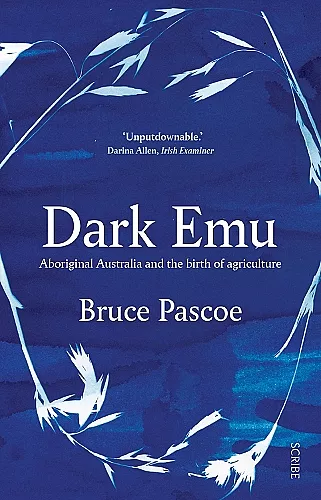Dark Emu
Aboriginal Australia and the birth of agriculture
Format:Paperback
Publisher:Scribe Publications
Published:10th May '18
Should be back in stock very soon

History has portrayed Australia’s First Peoples, the Aboriginals, as hunter-gatherers who lived on an empty, uncultivated land. History is wrong.
In this seminal book, Bruce Pascoe uncovers evidence that long before the arrival of white men, Aboriginal people across the continent were building dams and wells; planting, irrigating, and harvesting seeds, and then preserving the surplus and storing it in houses, sheds, or secure vessels; and creating elaborate cemeteries and manipulating the landscape. All of these behaviours were inconsistent with the hunter-gatherer tag, which turns out to have been a convenient lie that worked to justify dispossession.
Using compelling evidence from the records and diaries of early Australian explorers and colonists, he reveals that Aboriginal systems of food production and land management have been blatantly understated in modern retellings of early Aboriginal history, and that a new look at Australia’s past is required — for the benefit of us all.
Dark Emu, a bestseller in Australia, won both the Book of the Year Award and the Indigenous Writer’s Prize in the New South Wales Premier’s Literary Awards.
‘Australia’s education system tended to emphasise the struggle and pluck of settlers. Dark Emu shifted the gaze, pointing to peaceful towns and well-tended land devastated by European aggression and cattle grazing. In a nation of 25 million people, the book has sold more than 260,000 copies.’
* The New York Times *’Unputdownable.’
-- Darina Allen * Irish Examiner *‘An extraordinary book.’
-- David Greig * The Herald *‘The truth-telling must go on.’
-- Stephen Fitzpatrick * The Australian *‘This is the most important book on Australia and should be read by every Australian.’
-- Marcia Langton * The Australian *‘[A] brisk and lucidly written account … This is an important and deeply researched reinterpretation of Australian history and a stark warning about the danger of accepting received wisdom at face value.’
* Publishers Weekly, starred review *‘Dark Emu ... is revolutionary, the most important book published in Australia by any writer in this or any other century.’
* Jersey Evening Post *‘Essential reading for anyone who wants to understand what Australia once was, or what it might yet be if we heed the lessons of long and sophisticated human occupation.’
-- NSW Premier's Literacy Awards judging panel‘I’m grateful for a book that has so enlivened the engagement of Australians with their country’s history … In spite of half a century of eloquent activism and scholarship, most Australians still grossly underestimate the sophistication of Indigenous culture, technology and governance. The popular embrace of Pascoe’s work suggests that many are keen to learn.’
-- Tom Griffiths, Emeritus Professor of History at the Australian National University‘[Pascoe’s] arguments about the reality of Aboriginal agriculture, acquaculture, food storage and preservation are not new, but hitherto they have been buried in scientific papers, less accessible writings, or not pursued in such a sustained manner. He has done a great service by bringing this material to students and general readers, and in such a lively and engaging fashion … I heartily recommend this book to teachers of Aboriginal studies.’
-- Richard Broome, Emeritus Professor of History at La Trobe University'[A]n important book that advances a powerful argument for re-evaluating the sophistication of Aboriginal peoples’ economic and socio-political livelihoods, and calls for Australia to embrace the complexity, sophistication and innovative skills of Indigenous people into its concept of itself as a nation.'
-- Dr Michael Davis * Aboriginal History- Winner of Australia Council Award for Lifetime Achievement in Literature 2018 (Australia)
ISBN: 9781911344780
Dimensions: unknown
Weight: unknown
288 pages